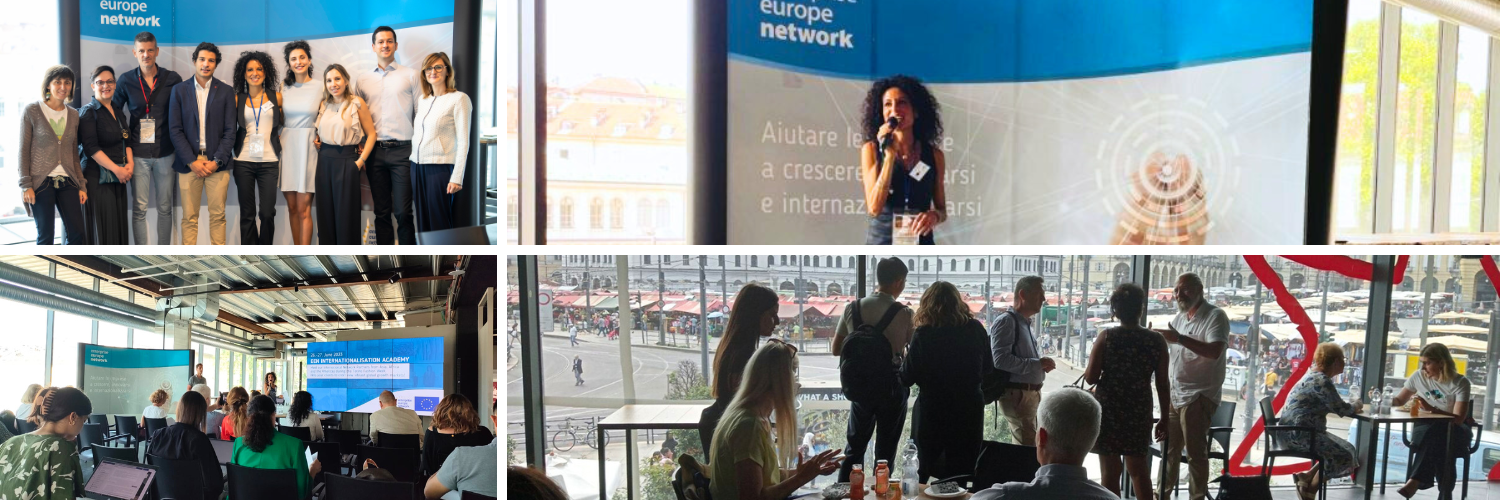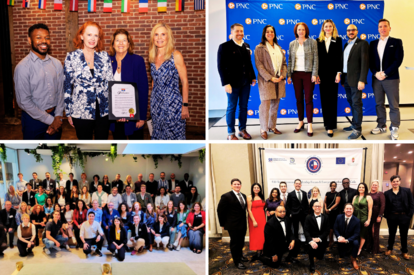
Taking your business international comes with its share of challenges but also exciting opportunities. Entering new markets can lead to increased sales, access to diverse talent, and a competitive edge in untapped regions. So, how do you begin? Here are 5 key tips to help you approach international expansion with confidence and clarity.
Expanding your business abroad can be both challenging and full of opportunities. New markets mean greater sales opportunities, access to global talent, and the chance to tap into markets your competitors may have overlooked. But where do you start? We’ve gathered 5 essential tips to help you navigate internationalisation with gusto.
1. Define your goals and find the right market
Your internationalisation plan should start with a key question: Why do you want to expand abroad? Whether it’s to boost sales, reduce costs, or find new talent, having clear and measurable goals is important. After you’ve pinpointed your reasons, choose a market that aligns with your business goals and objectives. How do you make the right choice, with so many options available? Here are some aspects to consider: What’s the size of your target market? What are the political, social, and economic conditions in the region? Do roads, ports, and international connections meet your needs? How do tax structures work? What language skills are essential? Once you understand the market context, be specific (think "Bali, Indonesia", rather than "Asia"), test your strategy, and grow from there.
2. Research your target market
Before venturing into a new country, you should first understand how that market works. What do customers like to buy? What are the market entry barriers? Does your pricing strategy align with the local customers’ purchasing power? What are the legal and regulatory requirements for your industry? What is the competition like? Do you have a network of local partners, distributors, or consultants to lean on? These are some of the questions you should consider about your target market.
There are two types of research that can help you get started. Secondary research – using existing data such as market reports and industry findings – is the quickest way to gather information about a new market. Trade groups, government websites, and research firms offer valuable insights into new markets.
But if you want a more tailored approach, that’s where primary research comes in. This means you gather data yourself, which often takes more time and resources. You can do this by attending trade fairs and business events to connect with people who know the market well. Social media and online surveys can also help you engage with potential customers and gauge their preferences and pain points. One thing to remember is that market research isn’t a one-and-done deal. Even after you set shop in a new country, you’ll need to keep researching to stay ahead of any changes in the market.
3. Know your competition
Understanding your competition is critical for success. So, before diving in, map out a thorough competitive analysis as part of your international expansion plan. A SWOT analysis is a simple yet effective way to compare your business to competitors in the new market. This allows you to assess your position across four key dimensions. First, look at your strengths: What makes your company, service, or product unique? Then, consider your weaknesses, such as the challenges you may face as a company expanding abroad. These can include, for instance, cultural differences or limited market experience. Next, explore the opportunities in the market, including its growth potential and what sets your offering apart. Finally, don’t forget about threats. Are local companies getting tax incentives or grants that your company can’t access?
4. Develop strong marketing and sales strategies
Marketing is crucial for winning new markets, but what works at home might not cut it abroad. Think about the cultural, language, political, and economic aspects of your target market. Tailor your message, translate content, and use words and visuals that resonate with local audiences.
When it comes to sales, you’ll need to decide how much you should adjust to fit the new market. There are various approaches you can explore. Exporting is a way to enter new markets without completely transforming your business operations. Licensing involves partnering with another business to sell your brand in exchange for a fee. Joint ventures, where you collaborate with another company to create a new product or service, carry more risks but also offer higher potential returns. Choosing the right strategy is a critical decision in your international expansion journey.
5. Build an international team
As small businesses expand globally, finding and keeping talent can be daunting. But hiring locally has big advantages. Local employees know the market, boost your credibility, and facilitate new partnerships. It’s crucial to understand employment regulations, and make international hires feel part of the team through effective onboarding, regular check-ins, and access to resources.
Moreover, cultivating a diverse and inclusive workplace can enhance your international expansion efforts. Encourage open dialogue and attentive listening within your team. Provide resources for learning about diversity and inclusion and celebrate the diverse perspectives and backgrounds that enrich your organisation.
How Enterprise Europe Network can help
The Network is a key ally for small businesses looking to grow internationally. Whether you’re eying growth in Europe or exploring emerging markets in Asia, Africa, or the Americas, the Network can help you achieve your global objectives. This could mean connecting you with new global suppliers, revamping your business strategy, or breaking down free trade agreements into plain language.
A big part of the Network’s support comes from its group of internationalisation experts. They collaborate with international Network partners, helping small businesses understand foreign markets, policies, and other key aspects of doing business abroad. The group cultivates international connections within the Network and supports clients through hands-on training programs and mentorship. One such initiative is the Mentoring Programme, which boosts the Network’s visibility in non-EU countries and encourages collaboration among international partners.
The internationalisation experts also join forces with other Network groups to equip small businesses for global expansion through networking and brokerage events. For example, they work with the textiles expert group to promote global Network events like the Torino Fashion Match. They also partner with the Network’s intellectual property experts to educate SMEs about intellectual property rights and the importance of cultural awareness when entering new markets.
The Enterprise Europe Network Internationalisation Academy and the Torino Fashion Match
The Enterprise Europe Network Internationalisation Academy is a new initiative supporting small businesses in their internationalisation efforts. Initially conceived to nurture in-person mentor-mentee relations within the Network, the event evolved to embrace a wider community, welcoming new international members. The Academy’s debut, hosted by Unioncamere Piemonte, drew 35 participants from around the world. The event featured expert speakers who covered a wide range of topics, from intellectual property rights to internationalisation strategies. Over two intense days, attendees engaged in business matchmaking sessions, delved into the operations of the Kappa sportswear company, and showcased their brands at the prestigious Torino Fashion Week 2023.
As part of the Fashion Week, the Network also organised the Torino Fashion Match, a business-to-business networking event. The gathering brought together fashion designers, small and medium-sized enterprises, retailers, and distributors from 40 countries. For fashion companies and designers, the Fashion Match opened doors to global recognition through fashion shows, awards, and insights into industry trends. For buyers and retailers, the event was an opportunity to discover unique market products and connect with well-known manufacturers worldwide.
Ready to kickstart your global journey? Get in touch with your local Network contact point and find out how our business advisers can help you.
Federica Leonetti chairs the group of textile experts and is part of the executive team working on internationalisation within Enterprise Europe Network. She’s an International Business Advisor at Unioncamere Piemonte, supporting textile and fashion SMEs. Federica is also an ESTEAM Ambassador, promoting digital and entrepreneurial skills for women and girls.
Related articles

In a world of saturated markets and shrinking attention spans, innovative SMEs must go beyond great products: they need smart, strategic communication to succeed globally. Discover five powerful tips...

Starting a business on a tight budget? You don’t need a huge marketing budget to see real results. In this article, we’ll share 4 affordable marketing strategies for small businesses, showing you how...

Is Texas your next big opportunity? You’re probably thinking of sizzling fajitas, rugged cowboys, or the sweet sound of Willie Nelson strumming his guitar. Well, Texas has all of that, but it’s also...

Start-ups need funding, mentorship, and networks to scale. Big companies are looking for fresh ideas, disruptive tech, and faster ways to stay ahead. When they join forces, both sides win. Keep...
